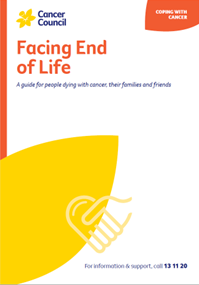- Home
- About Cancer
- Advanced cancer
- Facing end of life
- Choosing where to die
Choosing where to die
Choosing where you would like to die is a personal decision.
Learn more about:
- Making your choice
- Dying in your own home
- Dying in a palliative care unit or hospice
- Dying in hospital
- Dying in a residential aged care facility

We outline the options of dying in your own home, in a palliative care unit, in hospital, or in a residential aged care facility.
Making your choice
Deciding where you would like to be cared for as you approach the end of life can be difficult. Having some control over where death occurs is often considered a key factor in dying well. Where that place might be will be different for everyone.
The options available to you may include:
- your own home
- a palliative care unit (hospice)
- a hospital
- a residential aged care facility.
Where you would like to die may change as your situation progresses, or as practical concerns arise. You may want to spend as much time as possible at home, but feel more comfortable moving to a palliative care unit or hospital near the end. This is understandable and your wishes should be respected whenever possible.
It can take time to arrange somewhere to stay. Keep in mind that sometimes there may not be space available when you need it.
You may need to have ongoing conversations with your carers and medical team about the best place for your end-of-life care. This may include being in a familiar environment, being surrounded by family and friends, having good symptom control, and being able to maintain your dignity.
It’s a good idea to find out the views and preferences of your carers and family. Although dying is a natural process, few people have experience or knowledge of looking after someone who is dying, and they may be uncomfortable with the idea of caring for you at home.
Talking together about where you would like to be cared for and planning can increase the likelihood of receiving care where you wish.
In some cases, you may feel like your choice is limited, and that your situation helps decide the setting. This may be because you have medical needs that only a hospital or palliative care unit can meet, or you may live in an area too remote for home visits. Your house may be unsuitable, perhaps because of stairs or a small bathroom.
Talk to your health care or palliative care team about your concerns and find out what options may be available in your area.
Podcast: End-of-Life Care at Home
Listen to more episodes of our podcast for people affected by cancer
More resources
Prof Jane Phillips, Head, School of Nursing and Professor, Centre for Healthcare Transformation, Queensland University of Technology and Emerita Professor Palliative Nursing, University of Technology Sydney, NSW; Prof Meera Agar, Palliative Care Physician, Professor of Palliative Medicine, University of Technology Sydney, IMPACCT, Sydney, NSW; Sandra Anderson, Consumer; A/Prof Megan Best, The University of Notre Dame Australia and The University of Sydney, NSW; Prof Lauren Breen, Psychologist and Discipline Lead, Psychology, Curtin University, WA; David Dawes, Manager, Spiritual Care Department, Peter MacCallum Cancer Centre, VIC; Rob Ferguson, Consumer; Gabrielle Gawne-Kelnar, Counsellor, Psychotherapist and Social Worker, One Life Counselling & Psychotherapy, NSW; Justine Hatton, Senior Social Worker, Southern Adelaide Palliative Services, Flinders Medical Centre, SA; Caitlin MacDonagh, Clinical Nurse Consultant, Palliative Care, Royal North Shore Hospital, Northern Sydney Local Health District, NSW; McCabe Centre for Law and Cancer; Palliative Care Australia; Belinda Reinhold, Acting Lead Palliative Care, Cancer Council QLD; Xanthe Sansome, National Program Director, Advance Care Planning Australia; Kirsty Trebilcock, 13 11 20 Consultant, Cancer Council SA.
View the Cancer Council NSW editorial policy.
View all publications or call 13 11 20 for free printed copies.
Need to talk?
Support services
Caring for someone with cancer
Speak to a health professional or to someone who has been there, or find a support group or forum
Cancer Council Online Community
A community forum – a safe place to share stories, get tips and connect with people who understand
Cancer information
Advanced cancer
Information for all stages of advanced cancer, from the initial diagnosis to palliative care and grief
Resource hub
Guides, fact sheets, videos, podcasts and more for people with cancer, their families and friends

